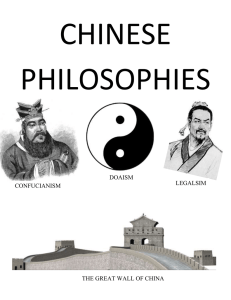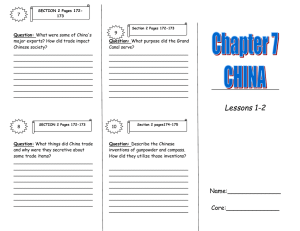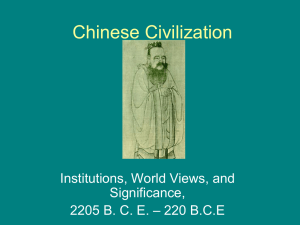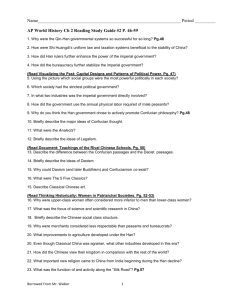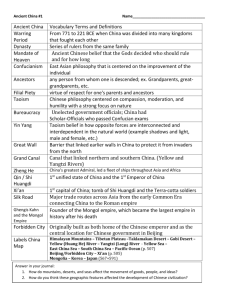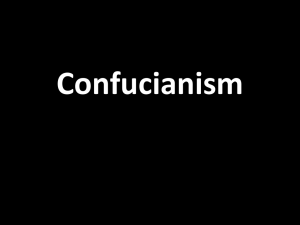Ancient China Empires: Dynasties, Religion, & Achievements
advertisement
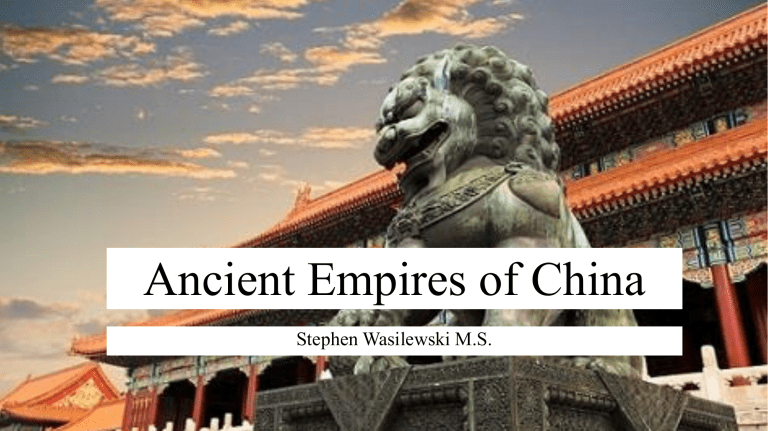
Ancient Empires of China Stephen Wasilewski M.S. The “River of Sorrows” • Chinese history began in the Huang River Valley, where Neolithic people learned to farm • Haung River got its name for the loess, or the windblown yellow soil that settles at the bottom of the river • Earned the nickname “River of Sorrow”, when floods came it caused crop damage, leading to mass starvation • In Chinese writing the Character for “misfortune” is a river Small Kingdoms arise • Shang Dynasty Develops at the Huang or Yellow River • Princes and Kings- organized clans- or group of families or ancestors who claim common ancestor and fought foreign invaders • Early Social Class: Kings, Warriors, Artisans, Merchants, and peasants • Zhou Dynasty 1122BC – Overthrew the Shang and held power until 256 B.C. • Claimed Mandate of Heaven- Meaning heaven would withdraw support of weak and corrupt dynasties to explain dynastic cycles- or the rise and fall of dynasties SUN TZU 544 B.C. Sun Tzu The most important text on military strategy Strong Rulers Unite China • In 221 B.C. the ruler of Qin proclaimed himself Shi Huangdi “First Emperor” • Built a strong authoritarian government • Abolished the old feudal states and divided China into 36 military districts, each ruled by appointed officials • Forced noble families to live in his capital at Xianyang and divided their land among the peasants • Peasants paid high taxes to support the army and building projects • Standardized weights and measures and replaced the diverse coins of the Zhou states with Qin coins • One writing system • Extended roads and canals Legalism Establishes Harsh Rule • Legalism was based on the teaching of Hanfeizi • According to Hanfeizi “The nature of man is evil, his goodness is acquired” • Greed, he declared, was the motive for most actions and the cause of most conflicts • Rejected the Confucian idea that people would follow the example of a good ruler • To Legalist, strength, not goodness was a ruler’s greatest virtue • Forced people to work on government projects • Shi Huangdi made Legalism his official policy • Used tortured, killed and enslaved many who opposed his rule • Approved a ruthless campaign of book burning • Only medicine and agriculture were spared Building the Great Wall • Shi Huangdi’s most remarkable and costly achievement was the Great Wall • It was built to keep out foreign invaders • Hundreds of thousands of laborers worked on the wall for years • It stretched for thousands of miles • The wall did not keep invaders out of China, it did demonstrate the emperors’ ability to mobilized China’s vast resources Chinese Religion • Originally people prayed to their ancestors to bring fortune to their families. • Veneration of Ancestors To honor their ancestors’ spirts they offered them sacrifices of food - “ancestor worship” • Eventually two belief systems would arise. Confucianism and Taoism Confucius Philosophy Confucius -tried and failed to become a government official so he chose instead to become a teacher • Confucius philosophy – a system or belief of ideas concerned with worldly goals. Ensuring social and government order. • Filial piety- respect for parents above all other duties His philosophy did not discuss salvation or spiritual existence but more of a moral code of obligations Confucianism • Confucianism never became a religion • Chinese rulers would base their governments on Confucian ideas • Only scholars educated in Confucian thought could became government officials • Introduced a long-lasting Chinese belief that the universe reflected a delicate balance between two forces, yin and yang • Yin was linked to Earth, darkness and female forces • Yang was stood for heaven light and male forces • To Chinese these forces were not in opposition • Well-being of the universe depended on harmony between yin and yang Taoism • Laozi- “Old Master” creates Taoism • Laozi credited with writing “The Way of Virtue” • Taoism teaches harmony with nature • Looked beyond everyday worries to focus on the Tao, or “the way” of the universe • Taoist rejected the world of conflict and strife • Taoism turned from the “unnatural” ways of society • Taoists viewed government as unnatural and therefore, the cause of many problems • “The best government was one that governed the least” Taoism (continued) • Many followers became artists or poets and believed government was unnatural • Taoism- believed in gods, goddesses, and magic. Priests would sell charms or talismans to protect people. Their development of chemistry (or magical research) led to the discovery of GUN POWDER and MEDICINE Rise of the Han Dynasty • After Shi Huangdi death in 210 B.C. the empire erupted into revolts overs high taxes, cruel polices and forced labor. • Liu Bang founded the new Han Dynasty • Claimed the Mandate of Heaven- heaven chose him as ruler • The most famous Han Emperor, Wudi strengthened the government and adapted Confucian policies • Boosted economic growth by improving canals and roads • Imposed a government monopoly on iron and salt • Followed the a policy on expansionism • “Warrior Emperor” Wudi, fought many battles to drive nomadic people beyond the Great Wall The Silk Road Links China to the West • Wudi opened up trade routes, later called the Silk Road • Would link China and the West • Silk road stretched for more than 4,000 miles and linked China to the Middle East • Some trade goods were sent across the Mediterranean to Rome The Han Civil Service System • Han emperors adopted the idea the civil servants or government officials should gain their position by merit • Established a system of exams for public service • Occasionally a village or wealthy family might pay for the education of a brilliant peasant boy • Confucian teachings about filial piety and superiority of men prevented women from taking the civil service exam The Han Golden Age • Advances in Science and Medicine • Hans astronomers improved earlier calendars and invented better timekeeping devices • Developed anesthetics • Used acupuncture • Inserts needles into the skin at specific points to relieve pain or treat illness • Advances in Technology • • • • Invented paper Fishing reels The rudder Suspension bridges • Art • Produced jade and ivory carving • Fine ceramic figures Buddhism spreads to China • By A.D. 100 missionaries spread Buddhism from India into China • Despite such obstacles, Buddhism became popular • Buddhism offered hope and eternal happiness • Nether Taoism nor Confucianism emphasized personal salvation • Buddhism absorbed Confucian and Taoist traditions After 400 years of Han Rule • Warlords- local military rulers began attacking and weakening the Emperors Kingdom • Heavy taxes and debt lead to revolts • Invaders poured over the great wall and added disorder and chaos • The Han Dynasty collapses Achievements of Early China • About 1000 B.C. the Chinese learned how to make a silk thread from the cocoons of silkworms • The Chinese develop a system of writing • Chinese writing system used pictographs, ideographs and signs that expressed thoughts of ideas • Oldest form of writing appeared on oracle bones • Paper was later invented in 105 B.C. under the Han Dynasty • Written Chinese took shape almost 4000 years ago • Evolved to included tens of thousands of characters or written symbols • Chinese scholars later turned writing into an elegant art form called calligraphy • Under the Zhou, the Chinese made the first book out of thin strips of wood or bamboo bounded together
